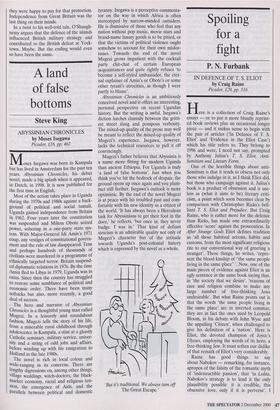A land of false bottoms
Steve King
ABYSSINIAN CHRONICLES by Moses Isegawa Picador, E16, pp. 462 Moses Isegawa was born in Kampala but has lived in Amsterdam for the past ten years. Abyssinian Chronicles, his debut novel, made a big splash when it appeared, in Dutch, in 1998. It is now published for the first time in English. Most of the action takes place in Uganda during the 1970s and 1980s against a back- ground of political and social tumult. Uganda gained independence from Britain in 1962. Four years later the constitution was suspended and Milton Obote seized power, ushering in a one-party state sys- tem. With Major-General Idi Amin's 1971 coup, any vestiges of constitutional govern- ment and the rule of law disappeared. Tens and perhaps hundreds of thousands of civilians were murdered in a programme of ethnically targeted terror. Britain suspend- ed diplomatic relations in 1976. By the time Amin fled to Libya in 1979, Uganda was in ruins. Since then the country has struggled to restore some semblance of political and economic order. There have been many setbacks but also, more recently, a good deal of success.
The hero and narrator of Abyssinian Chronicles is a thoughtful young man called Mugezi. In a leisurely and roundabout fashion, Mugezi tells the story of his life, from a miserable rural childhood through adolescence in Kampala, a stint at a ghastly Catholic seminary, military service, univer- sity and a string of odd jobs and affairs, before winding up with his emigration to Holland in the late 1980s.
The novel is rich in local colour and wide-ranging in its concerns. There are lengthy digressions on, among other things, Village weddings, witch-doctors, the black- market economy, racial and religious ten- sion, the emergence of Aids, and the Parallels between political and domestic tyranny. Isegawa is a perceptive commenta- tor on the way in which Africa is often stereotyped by narrow-minded outsiders. He is dismissive of those who feel that any nation without pop music, movie stars and brand-name luxury goods is to be pitied, or that the victims of political violence ought somehow to account for their own misfor- tunes. Towards the end of the novel Mugezi grows impatient with the cocktail party chit-chat of certain European acquaintances and quite rightly refuses `to become a self-styled ambassador, the eter- nal explainer of Amin's or Obote's or some other tyrant's atrocities, as though I were partly to blame'.
Abyssinian Chronicles is an ambitiously conceived novel and it offers an interesting, personal perspective on recent Ugandan history. But the writing is awful. Isegawa's diction lurches clumsily between the gritti- est street slang and pompous verbosity. The mixed-up quality of the prose may well be meant to reflect the mixed-up quality of Mugezi's experience. Isegawa, however, lacks the technical resources to pull it off convincingly.
Mugezi's father believes that Abyssinia is a name more fitting for modern Uganda than ancient Ethiopia. For Uganda is truly 'a land of false bottoms'. Just when you think you've hit the bedrock of despair, the ground opens up once again and you plum- met still further. Isegawa's outlook is more optimistic. By the end of the novel Mugezi is at peace with his troubled past and com- fortable with his new identity as a citizen of the world. 'It has always been a Herculean task for Abyssinians to get their foot in the door,' he reflects, 'but once in, they never budge. I was in.' That kind of defiant stoicism is an admirable quality not only of Mugezi's character but of the attitude towards Uganda's post-colonial history which is expressed by the novel as a whole.


















































































 Previous page
Previous page